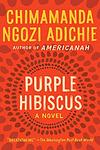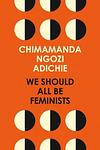The Greatest Nigerian "Contemporary" Books of All Time
Click to learn how this list is calculated.
This list represents a comprehensive and trusted collection of the greatest books. Developed through a specialized algorithm, it brings together 300 'best of' book lists to form a definitive guide to the world's most acclaimed books. For those interested in how these books are chosen, additional details can be found on the rankings page.
Genres
Contemporary books are a genre that focuses on stories set in the present day, often exploring current social, cultural, and political issues. These books are typically written in a modern style and often feature relatable characters dealing with real-life situations. Contemporary books can cover a wide range of topics, from romance and family drama to coming-of-age stories and thrillers. The genre is constantly evolving to reflect the changing world we live in, making it a popular choice for readers who want to stay up-to-date with the latest trends and issues.
Countries
Date Range
Reading Statistics
Click the button below to see how many of these books you've read!
Download
If you're interested in downloading this list as a CSV file for use in a spreadsheet application, you can easily do so by clicking the button below. Please note that to ensure a manageable file size and faster download, the CSV will include details for only the first 500 books.
Download-
1. Americanah by Chimamanda Ngozi Adichie
The novel follows a young Nigerian woman who emigrates to the United States for a university education. While there, she experiences racism and begins blogging about her experiences as an African woman in America. Meanwhile, her high school sweetheart faces his own struggles in England and Nigeria. The story is a powerful exploration of race, immigration, and the complex nature of identity, love, and belonging.
-
2. Purple Hibiscus by Chimamanda Ngozi Adichie
"Purple Hibiscus" follows the story of a 15-year-old Nigerian girl, Kambili, and her older brother Jaja, who live a privileged life in Enugu. However, their father is a religious fanatic and a domestic tyrant. The siblings are sent to their Aunty Ifeoma's home, a university professor, who provides them a taste of freedom and shows them a different way of life outside their father's oppressive rule. The novel explores themes of colonialism, religious fanaticism, and the post-colonial political situation in Nigeria.
-
3. The Stillborn by Zaynab Alkali
"The Stillborn" is a poignant narrative that explores the lives of women in a traditional African society, focusing on their struggles, resilience, and the quest for personal identity. The story delves into the complexities of polygamy, cultural expectations, and the impact of modernity on rural communities. Through the experiences of its female protagonists, the novel highlights the challenges faced by women in their pursuit of education, autonomy, and fulfillment in a male-dominated environment, ultimately offering a critique of the societal norms that stifle their growth and the transformative power of self-awareness and communal support.
-
4. Interpreters by Wole Soyinka
"Interpreters" weaves together the stories of a group of young Nigerian intellectuals navigating the complexities of postcolonial life in the 1960s. Through their intertwined lives, the novel explores themes of corruption, societal change, and the search for cultural identity. The characters, who work as interpreters both literally and metaphorically, strive to find their place in a country where the traditional and the modern are in constant tension. The narrative delves into their personal and professional struggles, shedding light on the broader political and social issues facing the newly independent nation.
-
5. We Should All Be Feminists by Chimamanda Ngozi Adichie
The book explores the importance of feminism in today's society and argues that gender equality is not just a women's issue, but a concern for everyone. Drawing from personal experiences and anecdotes, the author highlights the various ways in which gender inequality manifests itself and offers insightful perspectives on how we can work towards a more inclusive and equitable world for all.
-
6. My Sister, The Serial Killer by Oyinkan Braithwaite
In this darkly comedic novel, a nurse named Korede finds herself repeatedly cleaning up after her sister Ayoola, who has a disturbing habit of killing her boyfriends. As Ayoola's murderous tendencies escalate, Korede is torn between her loyalty to her sister and her growing concern for the next potential victim. As secrets unravel and tensions rise, the sisters' bond is put to the ultimate test, leading to a gripping and unexpected conclusion.
-
7. The Death of Vivek Oji by Akwaeke Emezi
The novel unfolds the mysterious circumstances surrounding the death of a young Nigerian named Vivek Oji. Through a non-linear narrative and multiple perspectives, the story delves into Vivek's complex identity and the struggles with gender, family expectations, and societal norms in a contemporary Igbo community. As the characters grapple with their grief and the secrets Vivek left behind, the novel explores themes of love, acceptance, and the liberating power of embracing one's true self. The poignant tale reveals the transformative impact Vivek had on the lives of those around him, even as they come to terms with the enigmatic nature of his life and untimely death.
Reading Statistics
Click the button below to see how many of these books you've read!
Download
If you're interested in downloading this list as a CSV file for use in a spreadsheet application, you can easily do so by clicking the button below. Please note that to ensure a manageable file size and faster download, the CSV will include details for only the first 500 books.
Download





